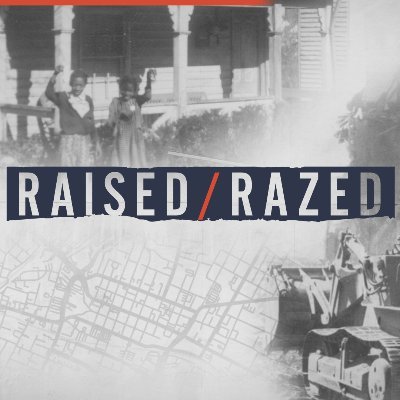A documentary film about the history and residents of the Vinegar Hill neighborhood and its ultimate destruction is receiving national recognition, winning two Telly Awards and a Capital Emmy Award in the past two months, in addition to becoming nationally syndicated on PBS stations.
Raised/Razed was created by accomplished filmmaker Lorenzo Dickerson and veteran journalist Jordy Yager, who started discussing the project several years ago after Virginia Public Media reached out to Dickerson about commissioning a new film.
“That’s when Lorenzo and I started thinking, ‘If we could tell any story at this moment in time, what would it be? And we said, ‘Vinegar Hill needs to be established as a place beyond its destruction, right? That really needs to be cemented in a visual format,’” said Yager in an interview on Charlottesville Right Now.
Dickerson, the founder of Maupintown Media, grew up in Albemarle County hearing stories about the neighborhood from older relatives.
“My aunt and uncle would talk about going to Vinegar Hill, these positive stories about going to the pool hall, going to the store, that sort of thing,” said Dickerson. “But in the last five to seven years, we were just hearing about its destruction.”
Like hundreds of other communities across the country, Vinegar Hill was demolished as part of the federal Urban Renewal Program, implemented in the 1950s and ‘60s. The film features a second community, the Hayti neighborhood in Durham, N.C. as a way of showing the widespread impact of the program.
The pair had collaborated previously on an article for C-VILLE Weekly in August 2017, profiling the people who spent their days and nights under the controversial Lee statue, formerly located in Market Street Park. They also co-created the African American Oral History Project for the Jefferson School African American Heritage Center, where Yager now serves as director of digital humanities. It was during the completion of that project that the pair were inspired to make Raised/Razed.
“We would go between these two spaces of Court Square in the downtown area, and the Heritage Center, and you have to walk through Vinegar Hill to get there,” said Yager. “And it’s about 75 percent parking lots today, which forces the question of: Who lived in this street or sidewalk or curb cut that I’m walking past? Whose house was this that I’m standing in or walking through?”
Among the subjects interviewed for the film is Ivan Glasgow, a former UVA student who interviewed former Vinegar Hill residents for a 1980 college project. Dickerson and Yager also built on the 2005 book titled Urban Renewal and the End of Black Culture in Charlottesville, Virginia by James Saunders and Renae Shackelford. They pored over property records and photos at the Albemarle Charlottesville Historical Society, learning that the the properties that had been declared slums and used as the basis for the neighborhood destruction were actually all rental properties that had been neglected by white owners.
Dickerson sums up the film’s lesson.
“For me, I think it’s that the decisions that are made… last much longer than we think. Even if it’s just the fact that these places that were destroyed throughout the country stayed as essentially parking lots for so many years, 40, 50 years, before… anything was done with them that was productive. The story that’s being told is that, ‘Oh, it was demolished to bring in new business and new economics and that sort of thing, but that just did not happen in many cases.”
Raised/Razed can be viewed online here.
For the full interview with Lorenzo Dickerson and Jordy Yager, click here.



